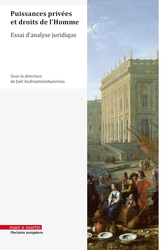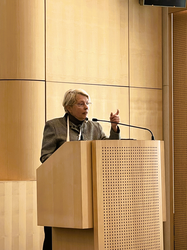Jan. 29, 2026
Conferences

🌐Follow Marie-Anne Frison-Roche on LinkedIn
🌐Subscribe to the Newsletter MAFR Regulation, Compliance, Law
🌐Subscribe to the video newsletter MAFR Overhang
🌐Subscribe to the Newsletter MaFR Law & Art
____
► Full reference : M.-A. Frison-Roche, "Le Droit de la Compliance, voie de la transition vers une égalité effective, efficace et efficiente entre les êtres humains (Compliance Law, for the transition towards the effectiveness, efficacy and efficiency of the equality between human beings)", in Chair "Mutualist and cooperative banking at the service of the economy", ESCP, Les banques coopératives et les transitions (Cooperative Banks and Transitions), 29 January 2026.
____
🧮view the general programme for the conference Cooperative banks and transitions (in French)
____
📶see the slides (in French)
____
► Presentation of this conference: The conference is not specifically aimed at lawyers, and even less so at specialists in Compliance Law. That is why it is divided into three parts, in order to show how Compliance Law is relevant in practice for creating effective, efficace and efficient equality between human beings.
The first part of the lecture sets out the ambition of equality between human beings. As this is a political principle and not a natural one. As it is an ambition, it justifies being placed first and after that this ambition must be concretised, in a sort of second place. This second place is built bay a tro : that of effectiveness (real application of the norm), efficacy (that the goal for which the norm was established is achieved) and efficiency (that the system is transformed so that, having become robust, it endures through sustainabily).
The second part of the conference will present the new branch of law known as Compliance Law. This should be distinguished from simple conformity, which consists of mechanically obeying a body of regulations that are constantly growing and becoming more complex. Compliance Law's Goal is to protect systems from risks that could cause them to disappear (all systems). "Sustainability" is the key principle, which is not limited to the climatic system (also digital system, banking system, and so on) and imposes the future as its object and the long term as its relevant time frame (unlike the market and Competition Law). "Transition" is also a key concept, as it involves moving from one state to another, from an expressed ambition to its realisation, through collaboration with others. These Goals are "Monumental" and are the normative legal basis of Compliance Law. In Europe, the Compliance Monumental Goal is to preserve systems for that the human beings who are involved in them, willingly or unwillingly, are not crushed by them, but rather benefit from them (for instance in banking sector). This is a "Monumental Negative Goal", to which is added a "Monumental Positive Goal", which a new conception of the "Ex Ante Responsability" (not liabily).
Dialectically, the third part of the conference explains how Compliance Law internalises the political ambition of equality between human beings, which develops in the three concentric circles of effectiveness, efficacy and efficiency, among the operators best placed to contribute to it.
Mutual banks belong to these circles more than the others. Firstly, because they are structured around the principle of taking human beings into consideration. Secondly, because they are rooted in their local areas. Thirdly, because they are driven by the long term, duration and sustainable. The transition est easer. The dificulty is the necessity to proof the effective and efficient will to do this transition.
____
⛏️Go further :
🕴🏻M.-A. Frison-Roche, 📝Drawing the circles of Compliance Law, 2017
🕴🏻M.-A. Frison-Roche, 📝Monumental goals, the beating heart of compliance law, 2021
🕴🏻C. Peicuti and 🕴🏻J. Beyssade, 📝The feminisation of management positions in companies as a compliance objective. The example of the banking sector, in 🕴🏻M. -A. Frison-Roche, 📘The Monumental Goals of Compliance, 2022
🕴🏻M.-A. Frison-Roche, 📝Births of a New Branch of Law: Compliance Law, 2024
________
Nov. 27, 2025
Interviews

🌐Follow Marie-Anne Frison-Roche on LinkedIn
🌐Subscribe to the Newsletter MAFR Regulation, Compliance, Law
🌐Subscribe to the video newsletter MAFR Overhang
🌐Subscribe to the Newsletter MaFR Law & Art
____
► Full reference : M.-A. Frison-Roche, ""Géomètres-experts : une profession qui assume concrètement sa responsabilité territoriale Géomètres-experts : une profession qui assume concrètement sa responsabilité territoriale (Chartered Surveyors: a Profession that takes its territorial responsibility seriously)", interview for JurisHebdo, 27 November 2025
___
► Read the interview (in French) in which the questions (translated below in English) were answered⤵
____
Q.You helped define the raison d'être of the profession of chartered surveyors and its Professional Order. In your opinion, what is its true consequences?
Q. Can the raison d'être become a tool for Compliance or Governance?
Q. What conflicts arise around the source of compliance norms and their implementation?
Q. Is this initiative part of a broader move towards social responsibility?
Q. How can the raison d'être influence the mission of the chartered surveyor, particularly in relation to land and environmental matters?
_________
⛏️Further reading on the subject:
🕴🏻M.-A. Frison-Roche, 🎤Designing a raison d'être and explaining it, 2025
🕴🏻M.-A. Frison-Roche, 📝The Monumental Goals of Compliance, the beating heart of Compliance Law, 2023
________
April 18, 2024
Publications

🌐follow Marie-Anne Frison-Roche on LinkedIn
🌐subscribe to the Newsletter MAFR Regulation, Compliance, Law
🌐subscribe to the Video Newsletter MAFR Surplomb
____
► Full reference: M.-A. Frison-Roche, "L’usage des puissances privées par le droit de la compliance pour servir les droits de l’homme" (Use of private companies by Compliance Law to serve Human Rights) , in J. Andriantsimbazovina (dir.), Puissances privées et droits de l'Homme. Essai d'analyse juridique, Mare Martin, coll. "Horizons européens", 2024, pp. 279-295
____
🚧read the Bilingual Working Paper on which this article is based, with more technical developments, references and hypertext links
____
► English Summary of this article: Following the legal tradition, Law creates a link between power with a legitimate source, the State, public power being its prerogative, while private companies exercise their power only in the shadow of this public power exercised ex ante. The triviality of Economic Law, of which Competition Law is at the heart, consisting of the activity of companies that use their power on markets, relegates the action of the State to the rank of an exception, admissible if the State, which claims to exercise this contrary power, justifies it. The distribution of roles is thus reversed, in that the places are exchanged, but the model of opposition is shared. This model of opposition exhausts the forces of the organisations, which are relegated to being the exception. However, if we want to achieve great ambitions, for example to give concrete reality to human rights beyond the legal system within which the public authorities exercise their normative powers, we must rely on a new branch of Law, remarkable for its pragmatism and the scope of the ambitions, including humanist ambitions, that it embodies: Compliance Law.
Compliance Law is thus the branch of Law which makes the concern for others, concretised by human rights, borne by the entities in a position to satisfy it, that is to say the systemic entities, of which the large companies are the direct subjects of law (I). The result is a new division between Public Authorities, legitimate to formulate the Monumental Goal of protecting human beings, and private organisations, which adjust to this according to the type of human rights and the means put in place to preserve them. Corporations are sought after because they are powerful, in that they are in a position to make human rights a reality, in their indifference to territory, in the centralisation of Information, technologies and economic, human, and financial means. This alliance is essential to ensure that the system does not lead to a transfer of political choices from Public Authorities to private companies; this alliance leads to systemic efficiency. The result is a new definition of sovereignty as we see it taking shape in the digital space, which is not a particular sector since it is the world that has been digitalised, the climate issue justifying the same new distribution of roles (II).
____
📝read the article (in French)
________
March 15, 2023
Conferences

► Full reference: M.-A. Frison-Roche, "Pourquoi le Droit de la Compliance ?" ("Why Compliance Law?"), in Roman Aydogdu et Hans De Wulf (dir.), Bruxelles, 15 march 2023.
____
🧮Read the full programme of this event
________

Updated: Dec. 28, 2022 (Initial publication: July 10, 2022)
Publications

♾️ follow Marie-Anne Frison-Roche on LinkedIn
♾️ subscribe to the Newsletter MAFR Regulation, Compliance, Law
____
 ► Full reference: M.A. Frison-Roche, Regulatory and Compliance Law, expression of the missions of a professional Order, Working Paper, July 2022.
► Full reference: M.A. Frison-Roche, Regulatory and Compliance Law, expression of the missions of a professional Order, Working Paper, July 2022.
____
🎤 This Working Paper has been done as basis for an intervention in the Annual Congress of the French Professional Order of the Géomètres-Experts, September 15, 2022 (conference given in French)
____
🎥watch the short presentation of this speech (in French)
____
🎥watch the full speech given on 15 September 2022, based on this working paper
____
► Summary of the Working Paper: Professional orders should not present themselves as exceptions, however legitimate they may be, in relation to a principle, which would be the competitive system, but as the expression of a principle. This principle is expressed by two branches of Law whose importance is constantly growing in European Law, liberal branches which are based on the conception of economic life and the definition of company, turned towards the future: the Regulatory Law and Compliance Law, two branches of Law at the same time related and distinct.
Indeed, and this is the topic of the first part, Competition Law conceives professional orders as exceptions since these "corporations" constitute structural agreements. French domestic legal system both consolidates the professional orders by backing them up to the State, which would sub-delegate its powers to them, but involves them in the questioning by the European Union of the States and their tools. Most often the temptation is then to recall with a kind of nostalgia the times when the professional orders were the principle but, except to ask for a restoration, the time would be no more.
A more dynamic approach is possible, in accordance with the more general evolution of Economic Law. Indeed, the Professional Order is the expression of a profession, a little-exploited concept in Economic Law, over which the Order exercises the function of "Second-level Regulator", the public authorities exercising the function of "First-level Regulator". The Banking and Financial Regulatory Law is built in this way and operates thank to that, at national, European, and global level. This is what should be linked.
The Professional Orders therefore have the primary function of spreading a "Culture of Compliance" among the professionals they supervise and beyond them (clients and stakeholders). This culture of Compliance is developed regarding the missions which are concretized by the professionals themselves.
Therefore, the second part of the Working Paper deals with the legal evolution of the notion of "Mission" which has become central in Economic and General Law, through the technique of the mission-based company. However, there are multiple points of contact between the raison d'être, the company with a mission and Compliance Law as soon as the latter is defined by the concrete and overly ambitious goals that it pursues. : the Monumental Goals.
Each structure, for example the French Ordre des Géomètres-Experts, is legitimate to set the Monumental Goal that it pursues and that it inculcates, in particular the conception of territory and the living environment, joining what unites all the Monumental Goals of Compliance: concern for others. The French Ordre des Géomètres-Experts, is adequate because it has a more flexible relationship, both tighter and broader, with the territory than the State itself.
By instilling this in professionals, the Professional Order develops in the practitioner an "ex ante responsibility", which is a pillar of Compliance Law, constituting both a charge and a power that the practitioner exercises, and of which the Professional Order must be the supervisor.
____
🔓read the Working Paper⤵️
Sept. 1, 2022
Thesaurus : Doctrine

► Full Reference: A.-V. Le Fur, "Intérêt et raison d’être de l’entreprise : quelle articulation avec les buts monumentaux de la compliance ?" ("Interest and “raison d’être” of the company: how do they fit with the Compliance Monumental Goals?"), in M.-A. Frison-Roche (ed.), Les Buts Monumentaux de la Compliance, coll. "Régulations & Compliance", Journal of Regulation & Compliance (JoRC) and Dalloz, p. 55-67.
____
📕read a general presentation of the book, Les Buts Monumentaux de la Compliance, in which this article is published
____
► Summary of the article (done by the Author): Companies would have a soul. The legislator thinks so, since the French law called "loi Pacte" of 22 May 2019 obliges managers to act in the Corporate Interest and allows companies to formulate themselves a « raison d'être ». Compliance Law does the same, relying on companies to save the world from corruption, slavery, terrorism and global warming, thus achieving Monumental goals.
At first glance, the contours of Corporate Interest and « raison d’être » of the company are not far removed from the notion of Compliance Monumental Goals. This is not surprising, since the objective that presided over their introduction into the French Civil Code is the same as that underlying Compliance Law : to rethink the place of the company in the global Society, by affirming long-term values or concerns. This is a reason to use these corporate law concepts in the context of an X-ray of the concept of Monumental Goals.
However, a comparative approach is disappointing. The divergences between corporate notions and compliance lead to the conclusion that company law is not intended to impose anything other than a corporate public order. Notions that are more philosophical than legal, Corporate Interest and « raison d'être » are assigned functions that limit their scope. The imperative nature of corporate rules, and this is a consequence of the above, cannot be compared with that of compliance: uncertain, it is also relative when compared with the "violence" of compliance rules. The impact of the notions of Interest and « raison d'être » remains thus mainly internal to the company.
According to a second approach, it cannot be ruled out that Corporate Interest and « raison d'être » allow for a better understanding of higher and universal values by Company Law. Corporate Interest may incorporate Compliance Monumental Goals while the « raison d'être » may constitute a perspective for the realization of these goals.
The stakes are high : when the interest of the company, as a legal person and autonomous economic agent, joins the Monumental Goals, the means of achieving the latter are multiplied by internalizing them in all companies, not just the largest ones. However, despite all good intentions, a company is only governable if the compass does not become an elusive and indecisive vane; in other words, if legal certainty is respected. This is why a legal ordering of the concepts is necessary, which ultimately leads to a suggestion of their domain, content and scope.
________
Sept. 1, 2022
Publications

♾️ follow Marie-Anne Frison-Roche on LinkedIn
♾️ subscribe to the Newsletter MAFR Regulation, Compliance, Law
____
► Full Reference: M.-A. Frison-Roche, "Place et rôle des entreprises dans la création et l'effectivité du Droit de la Compliance en cas de crise" ("Place and rôle of Companies in the Creation and Effectiveness of Compliance Law in Crisis"), in M.-A. Frison-Roche (ed.), Les Buts Monumentaux de la Compliance, coll. "Régulations & Compliance", Journal of Regulation & Compliance (JoRC) and Dalloz, 2022, p. 339-352.
____
📝read the article (in French)
____
🚧read the bilingual Working Paper which is the basis of this article, with additional developments, technical references, and hyperlinks
____
📕read a general presentation of the book, Les Buts Monumentaux de la Compliance, in which this article is published
____
► Summary of the article (done by the Journal of Regulation & Compliance): This article has a very topic: the place of private Companies, regarding the chapter's issue: "the ordeal of a crisis". The crisis constitutes a "test" it brings evidence. Let us take it as such.
Indeed, during the health crisis, Companies have helped the Public Authorities to resist the shock, to endure and to get out of the Crisis. They did so by force, but they also took initiatives in this direction. From this too, we must learn lessons for the next crisis that will come. It is possible that this has already started in the form of another global and systemic crisis: the environmental crisis. In view of what we have been able to observe and the evolution of the Law, of the standards adopted by the Authorities but also by the new case law, what can we expect from Companies in the face of this next Crisis, willingly and strength?
________
May 15, 1995
Thesaurus : Doctrine
► Référence complète ; J. Ph. Robé, "L'entreprise en droit", Droit et Société, n°29, 1995, pp.117-136.
____
________